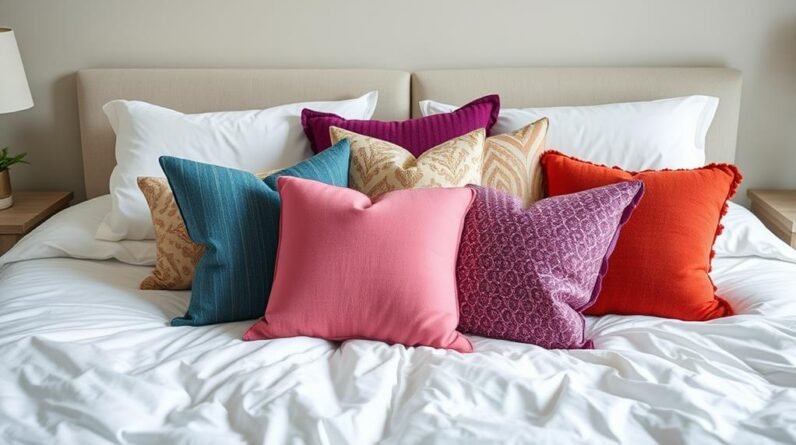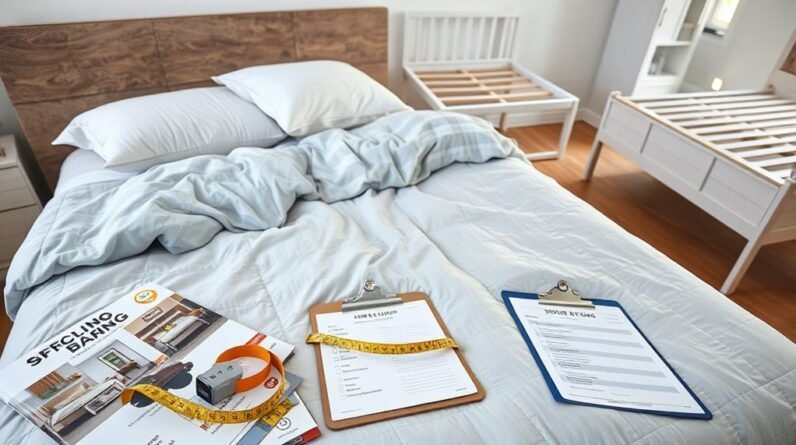
You’re about to spend a third of your life in bed, so choosing the right one is essential. First, consider the bed size and room space to guarantee a comfortable fit. Think about the type of mattress you need, whether it’s innerspring, memory foam, or hybrid. Your sleeping style and preferences also play a role, as side sleepers need softer mattresses and back sleepers require medium-firm ones. Additionally, consider the material and construction quality, your budget, and the brand’s warranty options. By weighing these factors, you’ll be well on your way to finding the perfect bed – and a great night’s sleep is just the beginning.
Bed Size and Room Space

When choosing a bed, the size of both the bed and the room are essential factors to take into account.
You’ll want to take into consideration how much space you have available in your bedroom, including the location of doors, windows, and any other furniture you plan to keep in the room. Measure your room carefully to determine the maximum size of bed that will fit comfortably.
You’ll also want to think about the size of the bed itself. Do you prefer a spacious king-size bed or a cozy twin?
Consider your personal preferences, as well as the needs of any partner or children who may be sharing the bed.
Don’t forget to factor in the height of the bed, including the frame and headboard, to guarantee you have enough clearance to move around the room comfortably.
Type of Mattress Needed
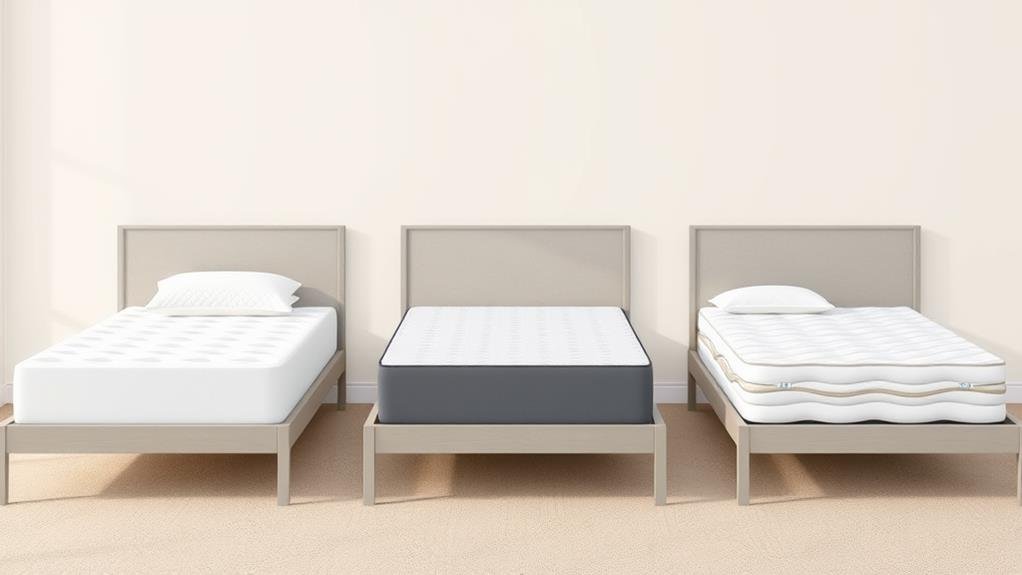
Comfort is key when it comes to choosing a mattress. You’ll be spending a significant amount of time sleeping on it, so it’s vital to select a type that suits your needs. There are several types of mattresses to evaluate, including innerspring, memory foam, hybrid, and all-natural.
You should examine the material and construction of the mattress. Innerspring mattresses feature coils that provide support, while memory foam mattresses conform to your body shape. Hybrid mattresses combine the best of both worlds, offering both support and pressure relief. All-natural mattresses are made from organic materials and are a great option for those who prioritize eco-friendliness.
Think about the benefits and drawbacks of each type. For example, innerspring mattresses tend to be more breathable, while memory foam mattresses can retain heat. Hybrid mattresses can be more expensive, but they often offer superior support and pressure relief. All-natural mattresses may be more prone to wear and tear.
Sleeping Style and Preferences
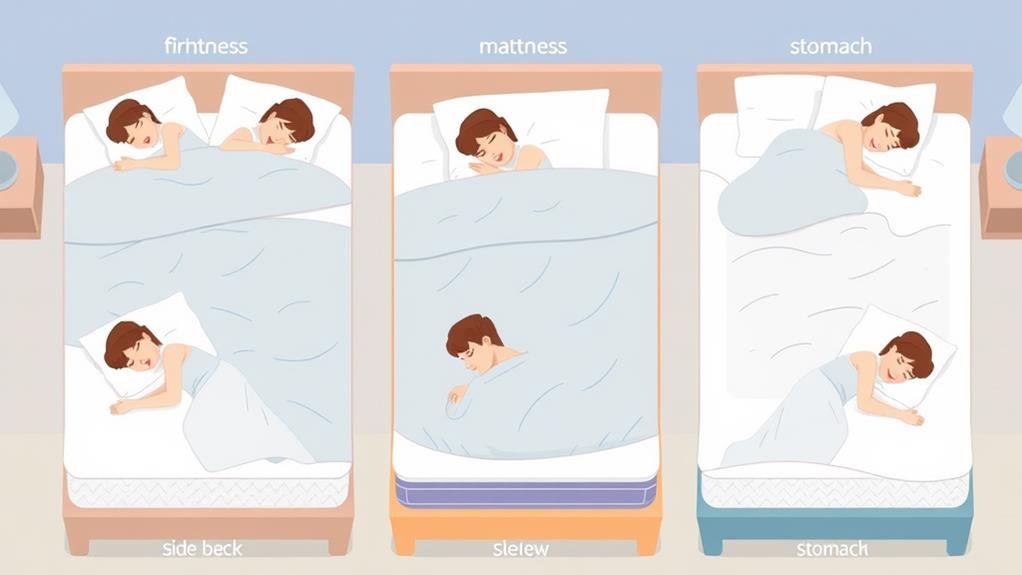
Beyond the type of mattress, your sleeping style and preferences play an essential role in determining the ideal bed for you.
Think about your typical sleeping position – are you a side sleeper, back sleeper, or stomach sleeper? If you sleep on your side, you’ll want a softer mattress to cushion your pressure points. Back sleepers require a medium-firm mattress to support their spine, while stomach sleepers need a firmer mattress to keep their hips aligned.
Consider your preferred sleeping temperature, too. Do you tend to sleep hot or cold? Some mattresses are designed to regulate temperature, so it’s crucial to choose one that suits your needs.
Additionally, think about your preferred level of support and pressure relief. Do you like a lot of support or a softer, more plush feel? Your preferences will help you narrow down the options and find the perfect bed for a restful night’s sleep.
Material and Construction Quality

Now that you have a better understanding of your sleeping style and preferences, it’s time to reflect on what’s inside your bed. You’ll want to contemplate the type of materials used in the construction of your bed, as well as the quality of those materials. Different materials can affect the comfort, support, and durability of your bed.
For example, if you tend to sleep hot, you may want to look for a bed with breathable materials like cotton or bamboo. On the other hand, if you tend to sleep cold, you may prefer a bed with insulating materials like wool or memory foam. When evaluating the construction quality, a thorough list of materials, such as those found in loft bed plans, can be beneficial in confirming that all necessary components are accounted for. This attention to detail can also help in creating a sturdy frame, which is essential for a well-made bed.
You should also reflect on the construction quality of your bed. A well-made bed will last longer and provide better support than a cheaply made one. Look for features like sturdy frames, secure joints, and high-quality stitching.
Don’t be afraid to ask questions about the construction process and the materials used. A reputable manufacturer will be happy to provide you with this information. By contemplating the material and construction quality of your bed, you can confirm that you’re getting a comfortable and supportive sleeping surface that will last for years to come.
Budget and Price Considerations

When it comes to buying a bed, one of the most essential factors to take into account is your budget. You’ll want to set a price range before starting your search to avoid overspending. Consider how much you’re willing to spend on a bed, taking into account factors like size, material, and features.
If you’re on a tight budget, consider buying a basic model or shopping during sales.
As you research beds, you’ll notice prices vary markedly depending on the type, brand, and quality. Memory foam beds tend to be pricier than innerspring ones, while luxury brands can command high price tags.
You’ll need to weigh the importance of features like cooling and heating systems, adjustable firmness, and advanced support against the added cost.
Ultimately, your budget will likely dictate the type of bed you can afford. Be realistic about your needs and priorities, and allocate your budget accordingly.
Consider financing options or delayed payment plans if needed. By setting a clear budget, you’ll be able to find a bed that meets your needs without breaking the bank.
Brand and Warranty Options
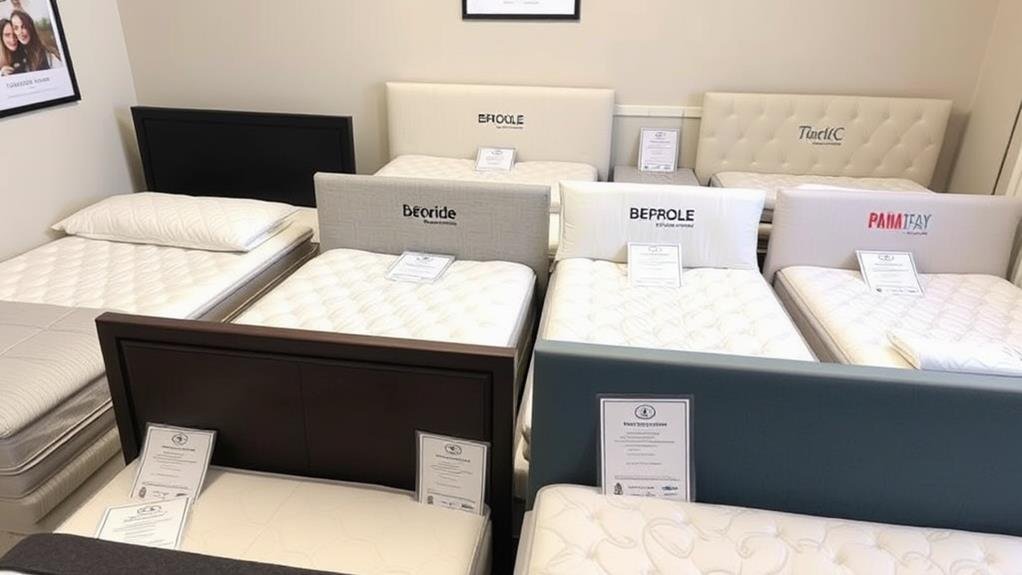
Your budget will likely influence the brands you consider, but it’s equally important to think about the reputation and reliability of the manufacturer.
You’re looking for a brand that produces high-quality beds that will last for years to come. A reputable brand will also provide good customer service, including a thorough warranty that covers defects and repairs.
When evaluating brands, consider the following factors:
- *Length of warranty*: Look for brands that offer a minimum 10-year warranty on their beds.
- *Type of warranty*: Check if the warranty covers all parts of the bed, including the frame, mattress, and any adjustable mechanisms.
- *Customer reviews*: Research online reviews from other customers to get a sense of the brand’s reputation and reliability.
- *Industry certifications*: Check if the brand has any industry certifications, such as those related to environmental sustainability or safety standards.
Frequently Asked Questions
What Is the Average Lifespan of a Mattress?
You’re wondering what the average lifespan of a mattress is? Well, you can expect it to last around 7-10 years, depending on the quality and type of mattress you choose, and how well you maintain it.
Can I Return a Mattress if I Don’t Like It?
You can return a mattress if you don’t like it, but you’ll need to check the return policy of the retailer or manufacturer first, as some may have restocking fees or strict return windows.
How Often Should I Rotate My Mattress?
You’ll want to rotate your mattress every 3-6 months to maintain its shape and prevent uneven wear. You’ll be extending its lifespan and ensuring a comfortable night’s sleep by doing so, and it’s easier than you think!
Can I Use a Mattress Topper With Any Mattress Type?
You can use a mattress topper with most mattress types, but you’ll want to check the manufacturer’s recommendations first. You’ll also need to take into account the topper’s material, thickness, and breathability to guarantee it complements your mattress.
Is It Worth Buying a Used or Refurbished Mattress?
You’re considering a used or refurbished mattress, but it’s not always the best idea. You’ll likely sacrifice warranty, quality, and cleanliness, and it might not provide the support and comfort you need for a good night’s sleep.
Conclusion
When buying a bed, you’ve got a lot to think about. Make sure you’ve considered the bed size and your room space, the type of mattress you need, and your sleeping style and preferences. Don’t forget to think about material and construction quality, your budget, and the brand’s warranty options. By carefully weighing these factors, you’ll find the perfect bed for a great night’s sleep. Now, go ahead and make an informed decision.






